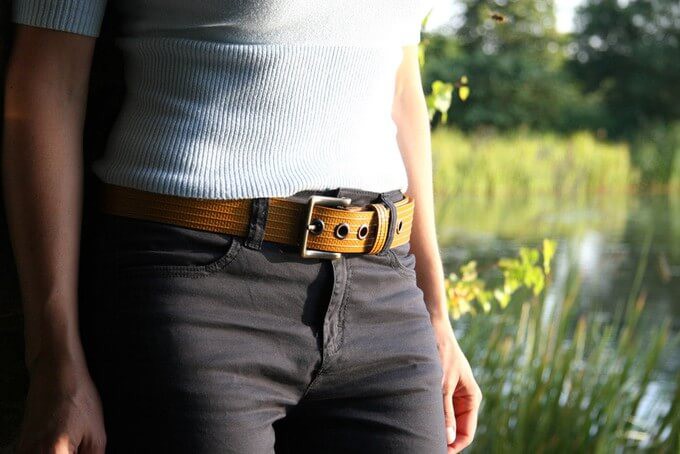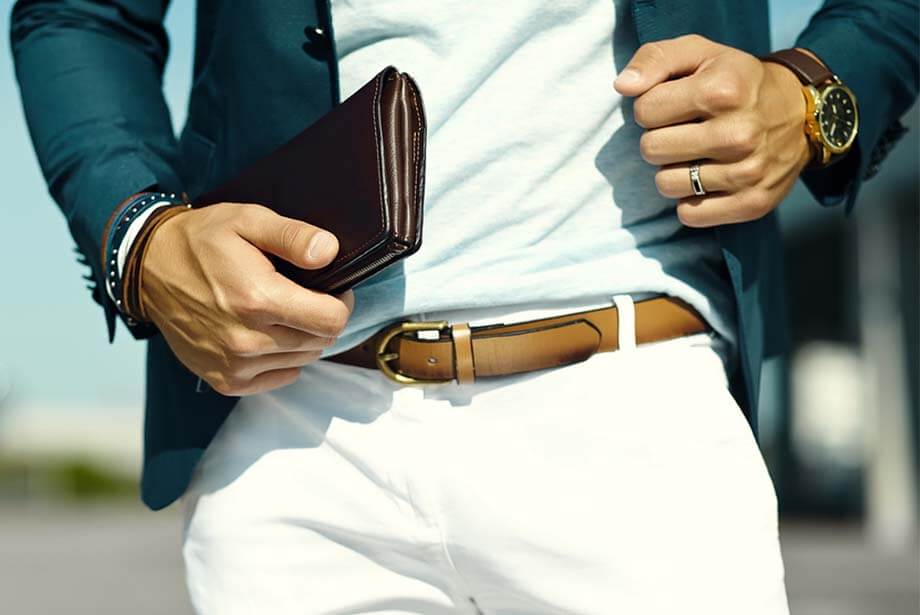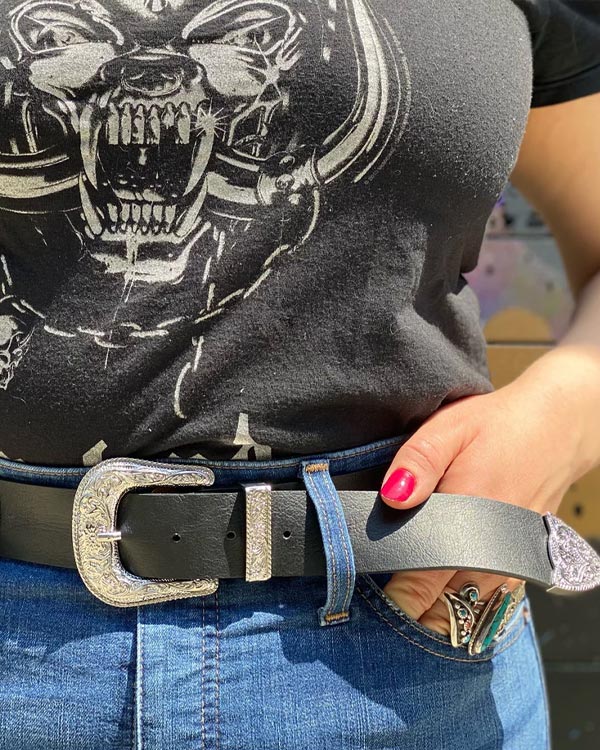Sustainable Leather Belts Guide: How to Choose Sustainable and Ethical Belts
Posted by Jason Clowrey on

Leather has been a popular material for making belts for centuries. It's durable, stylish, and can last for years if well maintained. However, leather production has a significant impact on the environment, and the treatment of animals in the leather industry has been a topic of concern for animal welfare advocates. As a result, consumers are increasingly looking for sustainable and ethical leather belts that minimise harm to the environment and animals. In this guide, we will provide tips on how to choose sustainable and ethical leather belts.
Common Questions About Choosing Sustainable and Ethical Leather Belts
- What are some tips for choosing sustainable and ethical leather belts?
- How can I ensure that the leather in my belt is from certified sources?
- What are some materials used in making sustainable and ethical leather belts?
- How can I find brands with ethical practices for making leather belts?
- What are some benefits of investing in a high-quality leather belt?
- What are some advantages of choosing locally produced leather belts?
- How can buying second-hand leather belts reduce the environmental impact of leather production?
- How can I take care of my leather belts to extend their lifespan and reduce the need for replacements?

8 Helpful Hints and Tips to Purchasing a Sustainable Belt
Choose Leather from Certified Sources
The leather industry has been associated with environmental degradation, such as deforestation, water pollution, and greenhouse gas emissions. To minimise the environmental impact of leather production, choose leather from certified sources.
Certifications, such as Leather Working Group (LWG), guarantee that leather has been produced in an environmentally responsible manner. LWG assesses the environmental impact of leather production and provides certification for leather tanneries that meet its standards. The certification considers factors such as water use, energy use, and waste management.
Another certification to look for is the Global Organic Textile Standard (GOTS), which ensures that the leather has been produced using organic farming practices, free from harmful chemicals. GOTS-certified leather ensures that the animal was not treated with antibiotics or growth hormones, and it also has a lower impact on the environment.
Choose Belts with Recycled Materials
Recycling materials help reduce the amount of waste that ends up in landfills and oceans. Choosing belts made from recycled materials is a great way to minimise environmental impact.
Recycled leather is a good option, as it uses scraps of leather that would otherwise be discarded. Recycled leather is processed to make new leather products, and it is a sustainable alternative to traditional leather.
Another material to consider is recycled plastic. Many belts are now made from recycled plastic bottles. These belts are durable, waterproof, and can be recycled again at the end of their life.

Opt for Vegan Alternatives
Vegan leather is a synthetic material that mimics the look and feel of leather. It is a sustainable alternative to traditional leather, as it does not involve the use of animals. Vegan leather is made from a variety of materials, such as polyurethane (PU) and polyvinyl chloride (PVC). These materials are durable and can last for a long time.
Another vegan option to consider is cork. Cork is a renewable material that comes from the bark of cork oak trees. It is lightweight, water-resistant, and durable, making it an ideal material for belts.
Choose Brands with Ethical Practices
When choosing leather belts, it's important to consider the practices of the brand. Look for brands that have ethical practices and are transparent about their supply chain.
Brands that use sustainable materials and work with certified suppliers have a lower impact on the environment. Additionally, brands that have ethical practices ensure that animals are treated with respect and are not subject to cruel treatment.

Invest in Quality
When buying leather belts, it's important to invest in quality. A high-quality belt will last for years, reducing the need for frequent replacements.
Look for belts made from full-grain leather, which is the highest quality leather available. Full-grain leather is durable, and it develops a unique patina over time, giving it a unique character.
Consider Local Production
Choosing locally produced leather belts helps support local businesses and reduces the environmental impact of transportation. When a product is produced locally, it has a lower carbon footprint, as it doesn't need to be shipped from far away.
Buying locally produced leather belts also ensures that you are supporting small businesses and artisans. Local production helps create jobs and supports the local economy.
Additionally, buying from local producers can also give you the opportunity to learn more about the production process and the materials used, which can help you make more informed and sustainable choices in the future.

Consider Second-hand Options
Buying second-hand leather belts is another way to reduce the environmental impact of leather production. Second-hand belts are often still in good condition and can be found at a lower cost than buying new.
Shopping at thrift stores or online second-hand retailers can be a great way to find unique and high-quality leather belts while reducing the demand for new leather products.
Take Care of Your Belts
Taking care of your leather belts can help extend their lifespan and reduce the need for replacements. Proper care can also help maintain the appearance of the belt and prevent damage.
To care for your leather belt, avoid exposing it to extreme temperatures, moisture, or direct sunlight. Use a leather conditioner to keep the leather soft and prevent it from drying out. Store the belt in a cool and dry place when not in use.
Top 5 Sustainable and Ethical Belts for Men
- Patagonia Men's Friction Belt - Made from 100% recycled polyester webbing and a buckle made from 100% recycled aluminium, this belt is a sustainable and durable option. It's also available in a variety of colours to match any outfit.
- Votch Men's Vegan Belt - Made from vegan leather and backed with recycled lining, this belt is cruelty-free and eco-friendly. The minimalist design is perfect for any occasion.
- Elvis & Kresse Reclaimed Fire Hose Belt - Made from reclaimed fire hoses, this belt is not only sustainable, but it also supports a great cause. A portion of the profits from the belt goes towards the Fire Fighters Charity.
- Buckle My Belt: Full Grain Leather Belts for Men - Made from full-grain leather sourced from ethical and sustainable tanneries, this belt is handmade in the UK. BuckleMyBelt.com offers a range of styles, colours, and sizes to choose from.
- Outerknown Belt - Made from recycled polyester and organic cotton, this belt is a sustainable option that also supports fair labour practices. The simple design makes it a versatile choice for any outfit.
Top 5 Sustainable and Ethical Belts for Women
- Matt & Nat Vegan Belt - Made from vegan leather and recycled nylon, this belt is a stylish and eco-friendly option. It's available in a range of colours to match any outfit.
- Nisolo Women's Classic Leather Belt - Made from ethically sourced, vegetable-tanned leather, this belt is a high-quality and sustainable choice. Nisolo is also committed to fair labour practices and transparency in their supply chain.
- Thought Clothing Braided Belt - Made from sustainable materials such as bamboo and organic cotton, this belt is a great option for those looking for eco-friendly fashion. The braided design adds a unique touch to any outfit.
- Buckle My Belt: Women's Leather Belt - Made from full-grain leather sourced from ethical and sustainable tanneries, the leather belts made by Buckle My Belt in the U.K. are second to none, offering a wide range of styles, colours, and sizes to choose from.
- Reformation Leather Belt - Made from recycled leather and available in a range of colours and sizes, this belt is a sustainable and stylish choice. Reformation is committed to reducing their environmental impact and promoting sustainable fashion practices.
Choosing sustainable and ethical leather belts is important for reducing the environmental impact of leather production and ensuring that animals are treated with respect. By choosing leather from certified sources, opting for recycled materials or vegan alternatives, investing in quality, and taking care of your belts, you can make more sustainable and ethical choices when it comes to fashion.
Share this post
- 0 comment
- Tags: Accessories, Casual, Fashion, Formal, Guide, Leather Belts, Mens Fashion, Women's Fashion
